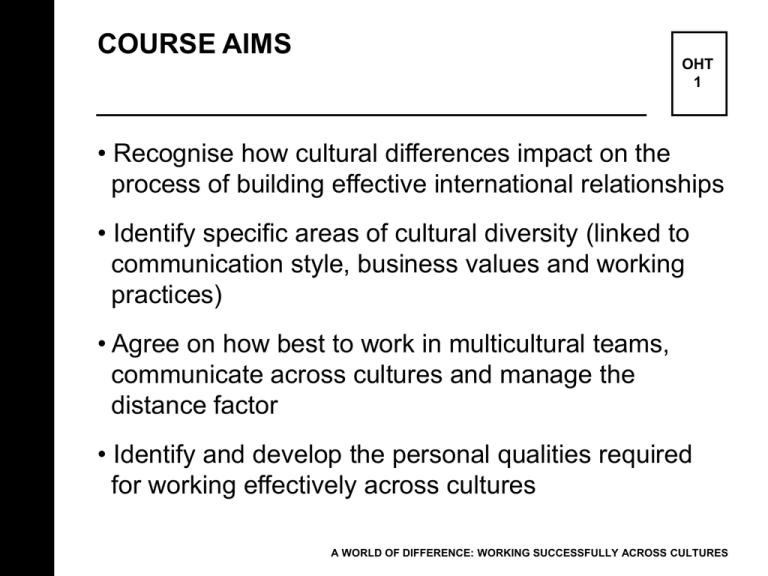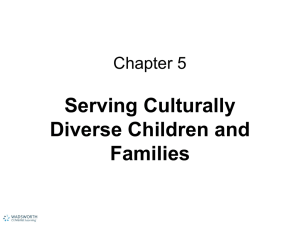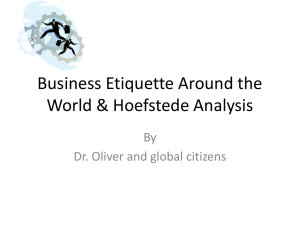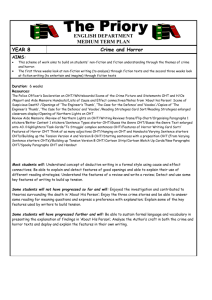ohts - WorldWork
advertisement

COURSE AIMS OHT 1 • Recognise how cultural differences impact on the process of building effective international relationships • Identify specific areas of cultural diversity (linked to communication style, business values and working practices) • Agree on how best to work in multicultural teams, communicate across cultures and manage the distance factor • Identify and develop the personal qualities required for working effectively across cultures A WORLD OF DIFFERENCE: WORKING SUCCESSFULLY ACROSS CULTURES PREVIEWING TASK OHT 2 • What process of globalisation is this company seeking to go through? • What is the role of Morel in this process? • What advantage will the company attain from moving to a global structure in taking its new product to the market? A WORLD OF DIFFERENCE: WORKING SUCCESSFULLY ACROSS CULTURES ICEBERG THEORY B1 V1 OHT 3 B2 V2 B = Behaviour (what you do and say) V = Values (beliefs about what is right to do and say) A WORLD OF DIFFERENCE: WORKING SUCCESSFULLY ACROSS CULTURES THE MIS FACTOR OHT 4 MIStrust MISperception MISevaluation MISinterpretation A WORLD OF DIFFERENCE: WORKING SUCCESSFULLY ACROSS CULTURES TYPES OF CULTURAL GROUPS • Nationality • Age • Gender • Physical ability • Socio-economic class • Sexual orientation • Political group • Organisational • Educational level/type • Functional • Religion • Manchester United supporters OHT 5 A WORLD OF DIFFERENCE: WORKING SUCCESSFULLY ACROSS CULTURES TOLERANCE ZONES Culture B number of people Culture A OHT 6 Relationship focus essential before task is typical Task focus before (optional) relationship focus is typical A WORLD OF DIFFERENCE: WORKING SUCCESSFULLY ACROSS CULTURES POLYCHRONIC PREFERENCE OHT 7 Belief: There are various ways to achieve our objectives so we should: • Keep options open as long as possible • Manage activities in parallel • Discuss things generally first • Be open to new inputs at all times • Value commitment to special people • Respond to changing priorities • Use schedules as guidelines • Invest time in people • Allow plans to evolve • Value multi-tasking behaviour Loosely based on the concepts of Edward T. Hall A WORLD OF DIFFERENCE: WORKING SUCCESSFULLY ACROSS CULTURES UNIVERSALISTS v PARTICULARISTS OHT 8 UNIVERSALISTS PARTICULARISTS Belief: Common standards and rules should be followed and everyone should be treated the same. Exceptions weaken the system we depend on: Belief: Obligations to particular people and special circumstances come before abstract rules. Without exceptions, we weaken the human ties we depend on: • Trust placed in systems and models • People are assigned to tasks • Core business focus • Standardisation & globalisation • Fairness & consistency • Transparency & simplification • Objective measurement • Similarity and linking (‘Yes, and…’) • Black & white photo – facts convince • Analytical marketing • Science of management • Trust placed in networks of relationships • Tasks are assigned to people • Flexible customer focus • Customisation & localisation • Particular circumstances & requirements • Appropriateness & contextualisation • Subjective measurement • Exceptions and disparity (‘Yes, but…’) • Oil painting – opinions convince • Personal networking • Art of management Loosely based on the concepts of Fons Trompenaars A WORLD OF DIFFERENCE: WORKING SUCCESSFULLY ACROSS CULTURES INDIVIDUALISTS v COLLECTIVISTS OHT 9 INDIVIDUALISTS • Values of freedom, honesty, self-actualisation COLLECTIVISTS • Values of harmony, face-saving, meeting in-group’s needs • ‘I’ identity • ‘WE’ identity • Individual goals • Group goals • Look after yourself and immediate family • Group loyalty provides security • Distinguish own priorities and opinions from others in the group • Do not distinguish own priorities and opinions from others in the group •Conflict is inevitable and if well channelled can lead to positive outcomes • Conflict should be avoided as it disturbs group harmony and so motivation • Control through personal guilt • Control through group shame • Strong sense of in-group/out-group, • Low sense of in-group/out-group, individuals form groups based on common high sense of personal obligation to in-group members and low or no interests or tasks; low sense of personal obligation to out-group members obligation to members of the group • There is a basic right to privacy • Private life is invaded by groups Loosely based on the concepts of H. Triandis, S. Ting-Toomey and G. Hofstede A WORLD OF DIFFERENCE: WORKING SUCCESSFULLY ACROSS CULTURES GAVIN’S STATE OF MIND OHT 10 GAVIN I was beginning to feel that I was pushing water uphill. GAVIN I mean, it was easy getting Morel to this stage…everyone on my team in England was singing from the same song sheet. But here, we had rock, jazz, classical…you name it … everyone brought their own piece of music with them… DARREN A chance to lead an international team… Think of the challenge, Gavin… GAVIN I’m thinking of the headaches! A WORLD OF DIFFERENCE: WORKING SUCCESSFULLY ACROSS CULTURES HIGH v LOW CONTEXT OHT 11 Lower Context CONTEXT message message TEXT Higher Context A WORLD OF DIFFERENCE: WORKING SUCCESSFULLY ACROSS CULTURES HIGH v LOW CONTEXT OHT 12 HIGH CONTEXT LOW CONTEXT Belief: Appropriate communication depends on decoding the situation, the relationship, the non-verbal behaviour (the context), so we should invest time in getting to know people to communicate efficiently using a shared code. Belief: Appropriate communication depends on using concrete logical, unambiguous task-orientated language (the text), so we should be explicit and transparent (personal relationships are nice but not necessary). Loosely based on the concepts of Edward T. Hall A WORLD OF DIFFERENCE: WORKING SUCCESSFULLY ACROSS CULTURES High Context Mexico Japan, Indonesia OHT 13 The Middle East Philippines Brazil India Singapore Greece France Africa (all) China Malaysia Spain Italy Costa Rica England Austria Australia USA Scandinavia Israel Swiss Germans Germany The Netherlands Low Context A WORLD OF DIFFERENCE: WORKING SUCCESSFULLY ACROSS CULTURES COMMUNICATION MEDIA OHT 14 • Telephone (including conference calls) • Video conference • Email • Answering machines/voice mail • Face-to-face meetings • SMS • Fax • Groupware (eg discussion forums) A WORLD OF DIFFERENCE: WORKING SUCCESSFULLY ACROSS CULTURES EMAIL FEEDBACK ORIENTATIONS OHT 15 HIGHER CONTEXT LOWER CONTEXT • Problem is a ‘We’ issue – no finger pointing • ‘I’ have a problem with ‘You’ issue • Relationship focus is high • Task focus is high • Feedback to be delivered in higher context mode • Feedback delivered within email message • Indirect/implicit language • Direct/explicit language • Face saving important • Clarity important A WORLD OF DIFFERENCE: WORKING SUCCESSFULLY ACROSS CULTURES EXAMPLE EMAIL 1 OHT 16 From: X To: Y CC: Subject: Urgent problem Dear…, I’m very rushed, so I need to keep the information very short and direct. I’m sorry, but I’m very disappointed and unsatisfied with the way you are working on this project. It does not meet at all the criteria we agreed upon from the start. You really need to do this in a much more professional way and according to our goals and criteria. Otherwise we really have a problem. I suggest that we will have a talk tomorrow. Then I will explain clearly what I mean, in case you don’t know yet, but I’m sure you are aware. Speak to you tomorrow at 14.00 A WORLD OF DIFFERENCE: WORKING SUCCESSFULLY ACROSS CULTURES EXAMPLE EMAIL 2 OHT 17 From: X To: Y CC: Subject: A request I had problems with my emails for the past few weeks and I lost several of them. Could it be possible for you to send me again the information you have about the project X? I’m sorry for the inconvenience. Regards A WORLD OF DIFFERENCE: WORKING SUCCESSFULLY ACROSS CULTURES EXAMPLE EMAIL 3 OHT 18 From: X To: Y CC: Subject: A slight worry… Dear …, I’m a little concerned on the basis of my recent experience that we might be missing some important information from your area We all agree that it was critical to share information comprehensively and quickly. Can I perhaps suggest we meet on… to discuss a way forward? Thanks A WORLD OF DIFFERENCE: WORKING SUCCESSFULLY ACROSS CULTURES BRITISH INDIRECTNESS OHT 19 From: X To: Y CC: Subject: A slight worry… Dear …, I’m a little concerned on the basis of my recent experience that we might be missing some important information from your area We all agree that it was critical to share information comprehensively and quickly. Can I perhaps suggest we meet on… to discuss a way forward? Thanks A WORLD OF DIFFERENCE: WORKING SUCCESSFULLY ACROSS CULTURES GAVIN’S EMAIL TO ALBERTO AND EVA OHT 20 From: Gavin To: Alberto; Eva CC: Darren; Jack; Mohammed; Jesse Subject: A slight hitch with the Market Research Dear Alberto and Eva Thank you for your input, however, there seems to be a bit of a problem with the European market research. I think we might want to consider cooling some of the marketing activities until everything is OK. I’ll be in touch soon. All the best Gavin A WORLD OF DIFFERENCE: WORKING SUCCESSFULLY ACROSS CULTURES EMOTIONAL IMPACT OF CULTURE SHOCK OHT 21 • Anxiety • Disconfirmed expectations • Exclusion • Ambiguity • Confrontation with one’s prejudices Based on Richard Brislin A WORLD OF DIFFERENCE: WORKING SUCCESSFULLY ACROSS CULTURES









